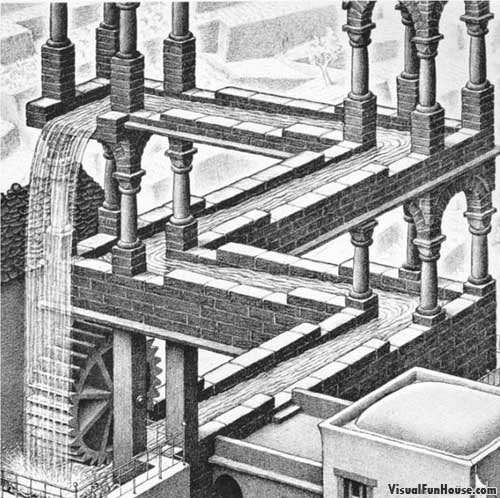1) Existence and Consciousness are inseparable
From an epistemological standpoint, I don't see any way these can be safely separated. Therefore, I'm assuming that they can't. There are other reasons, which are still a mess in my head, but I am more or less working from what I consider the indisputable truth of subjective experience.
2) Experience is the friction of incomplete information
Why do we never seem to remember locking our door? Why do we remember surprises more than routine things? Because we failed to predict, thus signifying new information. In information theory, it's called information content and is measured by how many bits it takes to store; if a probability distribution has a single outcome that is 100% likely to occur, that probability distribution has no information content.
Another way of thinking about this is that information content is also called entropy*, which in physics is the irreversible disorder that arises from motion, which is very related to that other phenomenon we call friction.
Wolfgang Iser brilliantly applies this theory to the experience we have when reading books and just about everything else in life seems to follow. When are video games boring? When there's no challenge left. When do movies suck? When they're way too predictable. But thankfully, things are always at least a little bit different than we anticipated them.
3) You need identifiers to signify difference but you need difference to distinguish the identifiers from one another; this paradox creates a regress loop.
To put that in English, let's consider the colors of objects. If everything were the color red, we'd have no such thing as color. We notice things because there are differences. This ties back in to what I said about information content in the previous post; if there's a 100% probability of one particular outcome, then there is no information.
So if we want difference, we need some trait in which these things are different. But where does this trait come from? It would need to be distinguished from something else. Therefore, we're faced yet again with the same problem ad infinitum.
One last thing is needed then, to close this odd regress loop. Once we've done that, we essentially have a system in which we can continue to seek information in a cycle of anticipation and surprise but never reach the end:

While writing this, I realized that I was missing the answer to this part. I will try a basic sketch of this:
-There is some kind of self-reference that closes the loop of this problem with infinite levels of "difference"
-The result manifests itself as a paradox (or many of them--perhaps they all mean the same thing) such as Godel's Incompleteness Theorem or the Time Dilation paradox.
-This creates a dog-chasing-its-tail effects in which a recursive pattern creates a fractal of uncountable codes--the friction of these being what we know to be reality.
But feel free to take a stab at the last part and let me know what you think...
I should note that by the time I finish Godel/Escher/Bach, it may be the case that Hofstadter beat me to the punch; in fact, he says that his thesis is that Meaningless Symbols Acquire Meaning Through Self-Reference, but so far it has proven to simply be the connective link that I have been missing between the three steps that I outlined above; I just hadn't put them together the right way, but they were all there a year ago.
------------------------------------------------------
*Forgive me if I've abused the poor term; I'm not a physicist.
No comments:
Post a Comment